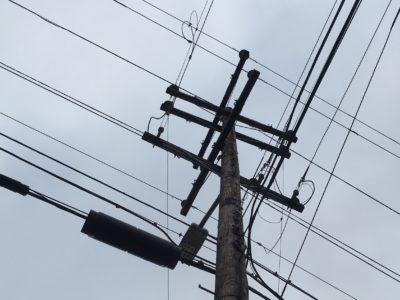The Power of the Purse
House Democrats have power to use appropriations process to stop Trump Administration environmental rollbacks
Dan has already posted about some of the big deregulatory steps the Trump Administration is likely to take in the next year. But the new Democratic majority in the House could have something to say about those steps, if they wanted to. Democrats will have even more leverage over spending bills than they had in the last Congress, since not only can they block bills in the Senate with a filibuster-proof minority, but they now have a majority in the House of Representatives...
CONTINUE READINGThe Year Ahead
Here's what to expect environmentally.
What are the key things to watch for in 2019 in the environmental area? Regulations. According to the Administration’s schedule, three big rules should be issued in March: repeal of the Waters of the United States rule (WOTUS), repeal and replacement of the Clean Power Plan, and the freeze on fuel efficiency standards. This seems very ambitious to me, especially for the last two where there are major technical issues to be resolved. EPA will likely lose at lea...
CONTINUE READINGThe Curious Case of EPA’s Mercury Cost-Benefit Decision
What, exactly, is EPA up to by changing the underlying analysis of the Mercury and Air Toxics Standard (known as the MATS rule), as it announced yesterday? Is it the first step in gutting the use of cost-benefit analysis to support strong environmental regulations? Is it a gift to Murray Energy in its lawsuit seeking to invalidate the MATS rule without actually withdrawing the rule, which would anger many utilities? Is it both? First, some background. The 1990 ...
CONTINUE READINGSeven Bright Spots of 2018
Even in bad times, some things move in the right direction.
Yes, it was a grim year in many ways. But there actually were some bright spots. Here are just the high points, but if you want more detail, I've added links to relevant earlier blog posts at the end of this post on the website. Scott Pruitt. Pruitt resigned under fire. While his successor may be more successful in some ways, the fact remains that Pruitt was a disgrace. We’re better off without him. Trump was apparently unfazed by his incompetence and aversion to ...
CONTINUE READINGJapan Quitting the International Whaling Commission
Will resume commercial whaling in July 2019 but only in national waters
To the surprise of many, Japan has announced that it is formally withdrawing from the International Whaling Commission and will resume commercial whaling in July. Japan has long been a pariah at the IWC, denounced by many for conducting rogue whaling through the Scientific Permit exception of the International Convention for the Regulation of Whaling (ICRW). Japan, in turn, has denounced what it views as cynical and illegitimate use of the ICRW to shut down all whaling o...
CONTINUE READINGTo Be or Not to Be an Energy Utility
Questioning the continued existence of California's largest energy utility
What can we do to ensure the safety of the massive electric and natural gas delivery systems that we rely on every day? Eight years after the horrific explosion and fire stemming from one of the Pacific Gas and Electric Company’s (PG&E’s) natural gas pipelines in San Bruno, California, the state’s legislators and utility regulators are still wrestling with that question. In the years just after the explosion, the hope was that imposing a billion dollar penalty ...
CONTINUE READINGEveryday Christmas: The Gift of the Commons
Clean air. Clean water. We receive these public goods every day without payment.
Every day, we reach receive bountiful gifts in the form of what economists call public goods. I thought it might be worth reposting some Christmas Eve musings on that subject. After all, the holiday season is a time for watching the same old movies and hearing the same old carols as before, so why shouldn't blog posts also be recycled?j. Maybe discussion of public goods -- and the Public Interest -- will someday become a Christmas tradition! Each day we receive bene...
CONTINUE READINGLooking Back at the 2018 Elections (Governors Races & California House Seats).
Both sets of elections went well for pro-environmental candidates.
Before the election, I did blog posts on some key governors’ races and California House races. How did those come out? As it turns out, pro-environmental Democrats swept these races, many of which had been rated as toss-ups and some of which did turn out to be very close. I picked these GOP-held seats because forecasters viewed them as in play, but certainly with no thought that the results would be so one-sided. I would not have been shocked if the Republic...
CONTINUE READINGA Legal Planet Milestone
The blog has now had more than two million views since its founding.
I'm pleased to announce that the number of hits on Legal-Planet.org has just passed the one million mark. Before we switched to the new site in 2013, we had amassed over a million hits at our previous site, so the blog is now past the two-million mark since the blog was founded in March 2009.. That doesn't include the nearly one thousand subscribers who receive each of our posts by email. And we've even gotten into the formal law review literature with 165 citation...
CONTINUE READINGWhat Does Trump’s “Waters of the U.S.” Rollback Mean for California?
It might not be what you'd think.
Last week, the Trump EPA announced its proposed rule to roll back the Obama administration’s 2015 “Waters of the United States” rule (“WOTUS Rule”). Early in his tenure, Trump had announced his intent to repeal and replace the WOTUS Rule, and the proposal is, as billed, an attempt to replace the existing WOTUS Rule with a regulation that significantly limits the types of water bodies that can be considered jurisdictional “waters of the United States” unde...
CONTINUE READING











